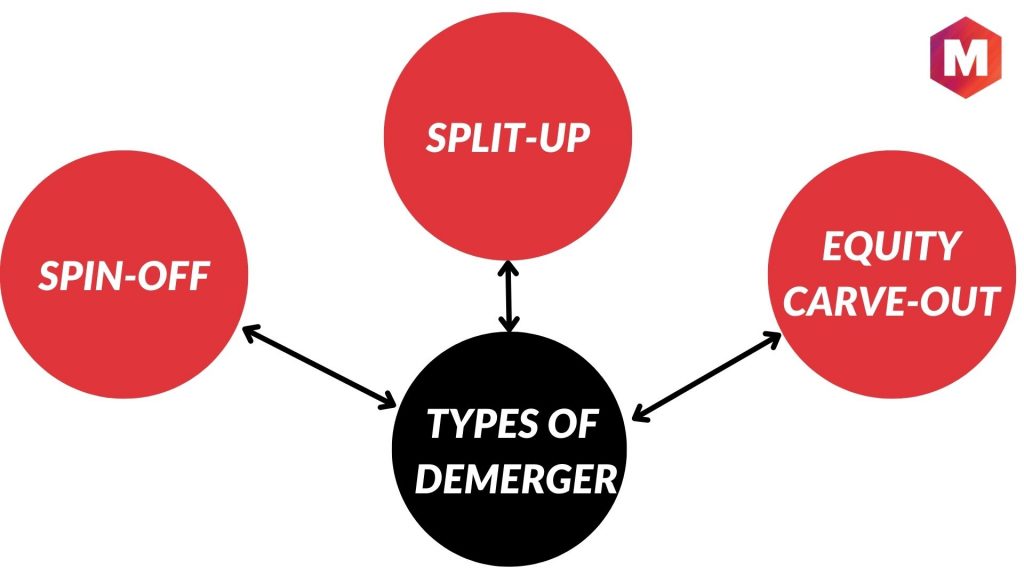A demerger is a type of corporate restructuring in which a company splits into two or more separate entities. This separates the company’s operations, assets, and liabilities into two distinct businesses. Demergers can be either partial or complete.
In a partial demerger, one business unit is spun off as a separate entity, while the remaining business units continue to operate under the same company. In a complete demerger, the company is split into two or more completely independent companies.
Table of Contents
What is De-merger?
Demerger is the process of reorganizing a company by dividing it into two or more parts, each of which becomes an independent company. A demerger is a form of corporate structural change in which the entity’s business activities are divided into different components. It is the polar opposite of a merger or acquisition.
For many reasons, a demerger could be necessary, such as concentrating on a company’s core functions and separating less essential divisions in order to raise cash or to deter an unwanted takeover.
Meaning of Demerger
De-mergers are a smart approach for businesses seeking to refocus on their most profitable units. It also helps in reducing risk and enhancing shareholder value. Those parent companies that hold many subsidiaries get discounts from analysts that could be 15-30%. The reason is the hidden allocation of capital.
The transfer of a company’s business activities to separate legal entities is known as a demerger. The demerged firm, which is the source company, is referred to as the demerged company. The other business is generally known as the resulting business.
Types of Demerger

A demerger can be of two types
1. Spin-off
When a new company is created from an existing one and both companies are independent after the demerger, it is called a spin-off.
2. Split-up
When an existing company is split into two or more companies and all the companies are independent after the demerger, it is called a split-up.
3. Equity carve-out
A firm may sell part of its equity stake in a subsidiary to a third party or to a strategic investor in this case. Equity carve-out is the term for such a transaction.
Reasons for Demerger
There are several reasons why a company may choose to demerge. Some of those are-
1. To focus on the core business
One of the primary reasons for demerging is to enable the parent company to focus on its core business. When a company has many non-core businesses, it may want to demerge them so that it can focus on its main operations.
2. To unlock value
Another reason for demerging is to unlock value. When a company has businesses that are not performing well, demerging them can help to improve the overall performance of the company.
3. To raise funds
Demerging can also be done to raise funds. When a company wants to raise money, it may demerge one of its businesses and use the proceeds to finance other operations.
4. To avoid takeover
Demergers can also be done to avoid a takeover. When a company is facing a hostile takeover, it may demerge some of its businesses to make itself less attractive to potential acquirers.
5. To comply with regulations
In some cases, demerger may be done to comply with regulations. For example, if a company is required to divest itself of a certain business to obtain approval for a merger, it may do so by demerging the business.
How do Demergers Work?
The process of demerging can be divided into four steps:
- The board of directors of the company decides to demerge the company.
- A scheme of arrangement is prepared and filed with the court.
- The shareholders of the company vote on the scheme of arrangement.
- The court approves the scheme of arrangement and the demerger is completed.
Advantages of Demerger
1. Increased Efficiency
A demerger can lead to increased efficiency as the parent company can focus on its core business and the resulting companies can focus on their businesses.
2. Increased shareholder value
A demerger can also lead to increased shareholder value as the shareholders of the parent company will get shares in the resulting companies.
3. Tax benefits
A demerger may also provide tax benefits to the shareholders of the parent company.
4. Improved financials
A demerger can also lead to improved financials as the businesses are separated and each company is responsible for its finances.
5. Management Accountability
A demerger can also lead to increased management accountability as the managers of the resulting companies will be accountable for their performance.
6. Increase in Market Capitalization
A demerger can also lead to an increase in market capitalization as the shares of the resulting companies will be traded on the stock exchange.
7. Improved governance
A demerger can also lead to improved governance as the board of directors of the resulting companies will be responsible for their own performance.
8. Access to new markets
A demerger may also provide access to new markets for the resulting companies.
9. Reduced risk
A demerger can also lead to reduced risk as the businesses are separated and each company is responsible for its own risks.
10. Increased transparency
A demerger can also lead to increased transparency as the financials of the resulting companies will be available to the public.
Disadvantages of a De-merger
1. Short-term disruption
A demerger can cause short-term disruption as the businesses are separated and each company is responsible for its own operations.
2. Long-term planning
A demerger may also require long-term planning as the companies need to be integrated back together in the future.
3. Costs
A demerger can also be costly as the companies need to be valuation and the process of separating them can be complex.
4. Regulatory approval
A demerger may also require regulatory approval, which can be time-consuming and expensive.
5. Tax implications
A demerger can also have tax implications as the shareholders of the parent company will need to pay taxes on their shares in the resulting companies.
6. Unknown outcome
The outcome of a demerger is unknown and it may not always lead to increased shareholder value.
7. Management changes
A demerger can also lead to management changes as the managers of the resulting companies will be accountable for their performance.
8. Increased competition
A demerger can also lead to increased competition as the resulting companies will be competing against each other.
9. Market uncertainty
A demerger can also cause market uncertainty as the shares of the resulting companies will be traded on the stock exchange.
10. Job losses
A demerger can also lead to job losses as the businesses are separated and each company is responsible for its own operations.
De-Merger Examples around the world
In India, Reliance Communications and Reliance Jio Infocomm have demerged their wireless business into two separate listed companies.
In the United States, Hewlett-Packard has demerged its personal computer and printer businesses into two separate companies.
Australian airline Qantas split its domestic and international business into two listed companies.
French oil company Total demerged its refining and marketing businesses into a separate company, known as Total Refining & Marketing.
British retailer Marks & Spencer demerged its food business into a separate company, known as Ocado Group.
Conclusion!
The demerger is when the company shareholders carrying out corporate finance split the business into two or smaller companies. This is often done so that the larger company can focus on its core business and the smaller companies can operate more effectively. The demerger can be beneficial for both- company’s shareholders and the company, but it can also be complicated and risky. Make sure you understand all the relevant business implications before proceeding with a demerger.
